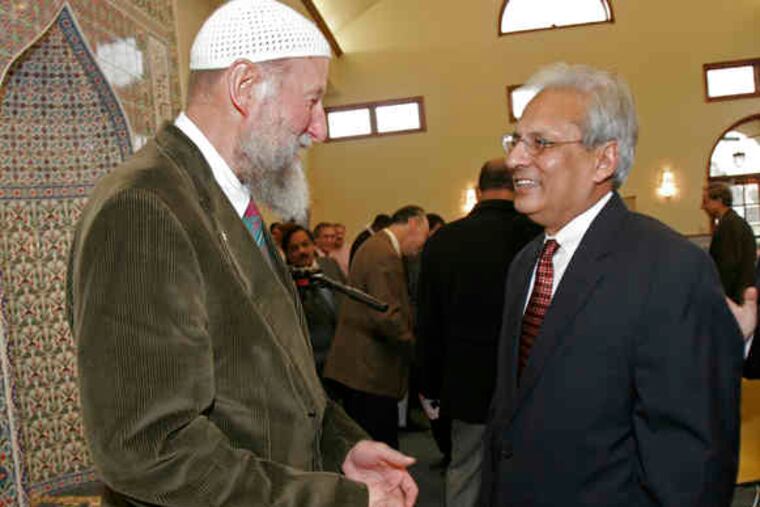Zia Rahman, 64; worked to ease religious tensions
He was known for building a mosque in Voorhees. But Zia Rahman, the soft-spoken managing director of the Muslim American Community Association, will be better remembered for building bridges of understanding to other faiths, relatives and friends said yesterday.

He was known for building a mosque in Voorhees.
But Zia Rahman, the soft-spoken managing director of the Muslim American Community Association, will be better remembered for building bridges of understanding to other faiths, relatives and friends said yesterday.
Mr. Rahman, 64, died Tuesday at his Voorhees home after struggling for months with a brain tumor.
A viewing was held yesterday at Platt Memorial Chapel in Voorhees, followed by prayer at his mosque - the Voorhees Islamic Center - and burial in Makbarat As-Salaam Cemetery in Marlboro, N.J.
Mr. Rahman was a goodwill ambassador for his faith, speaking before community groups, churches, and synagogues to encourage a better understanding of Islam.
His work bore fruit last year in a rare agreement of cooperation and understanding between the association, which operates the Voorhees mosque, and the Diocese of Camden. The pact was believed to be one of only two in the nation between the faiths.
"He wanted to unite people and clear up wrong impressions about Islam," said his wife, Zahida. "He wanted everybody, no matter what their belief, to love one another. That was his mission."
Yesterday, Camden Bishop Joseph A. Galante said he was "deeply saddened" by Mr. Rahman's death and offered "condolences to his family and the Muslim community"
"I always will be grateful for the role he played in promoting respect and understanding between the Muslim and Catholic communities of South Jersey," he added.
One of those who worked closely with Mr. Rahman was the Rev. Joseph Wallace, pastor of Christ the King Catholic Church in Haddonfield and diocesan director of ecumenical and interreligious affairs.
"Besides the love he had for his faith and the Muslim community, he was involved with the other faith communities - Jews and Christians - so we would have a better understanding of Islam and he and his people would have a better understanding of our religious traditions. He was a very spiritual person and dear friend, and I will miss him terribly."
Mr. Rahman and the members of the Muslim American Community Association ran into opposition about six years ago when they began to search for a mosque site. The first sign of trouble was an anonymous flier distributed in Voorhees in 2003, suggesting the mosque might attract worshipers with ties to terrorists.
The 15-family congregation pushed on with the help of friends it had made. Mr. Rahman met at his home with supporters of various faiths, who formed the Coalition for Multi-Faith Democracy. Together, they worked to encourage tolerance and tear down stereotypes.
Mr. Rahman "was a man of peace who condemned terrorism," said Alan Respler, retired director of the Jewish Community Relations Council. "He believed terrorism was bad and people had to learn to live with each other, understand each other. He was a wonderful man who brought people of different backgrounds together."
The effort to build the mosque, with help from other religious groups, was a defining moment for Mr. Rahman, who seemed unruffled by adversity. It was the subject of a documentary, Talking Through Walls, which has been shown locally and is to be shown on PBS this year.
"I would be angry, but Zia would say, 'You have to understand people. The neighbors are scared,' " said Lori Volpe, a longtime friend and member of the Coalition for a Multi-Faith Democracy.
"He never reacted in a hostile way. He always gave people benefit of doubt," Volpe said. "With all that aggravation, he still kept dignity and a big heart."
Mr. Rahman, a native of Pakistan and retired director of corporate information technology at Rohm & Haas Co., reached out to other faiths by speaking in churches and synagogues. He also teamed up with a retired Jewish professor to hold classes for Muslim and Jewish 11th and 12th graders to foster better relations.
His work helped pave the way for others to build mosques. Quresh Dahodwala, a longtime Cherry Hill resident, is helping to build one in the township and remembers Mr. Rahman's successful struggle.
"He didn't take credit for it," said Dahodwala, who was a friend of Mr. Rahman's. "He was very humble and said it was God's accomplishment."
It was Mr. Rahman's "invisible accomplishment," not the building of the mosque, which was "more significant," Dahodwala said.
"Changing hearts and minds is more important than building a mosque, but he did both," he said. "We should continue the efforts he started so we can build bridges."
Mr. Rahman died as his wife recited prayers at his side.
In addition to her, Mr. Rahman is survived by his sons, Zahid and Nabeel, and five brothers.